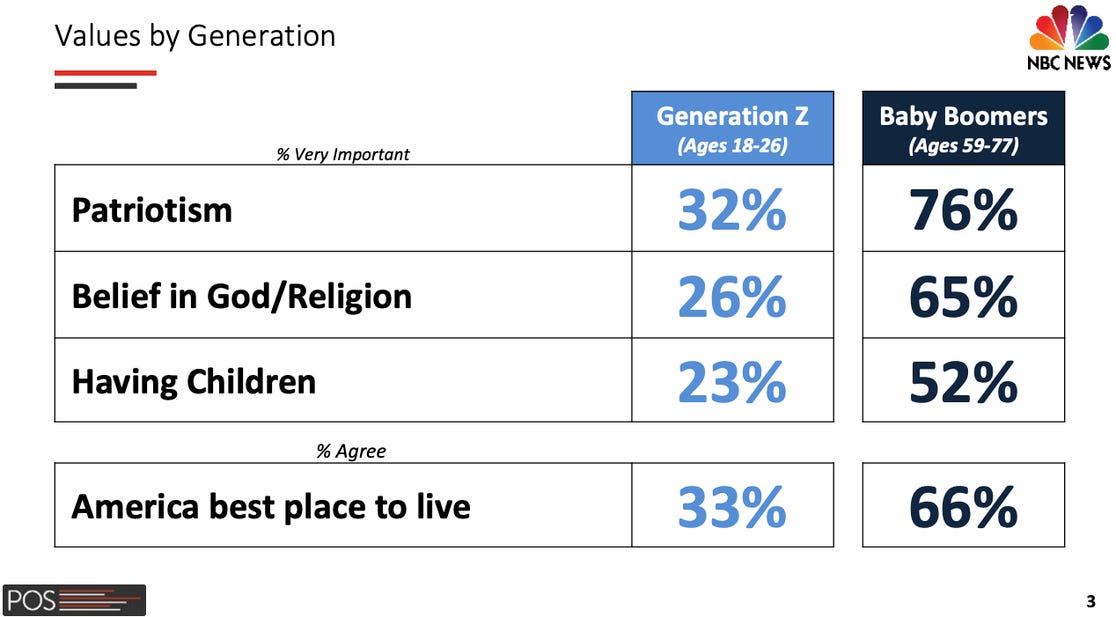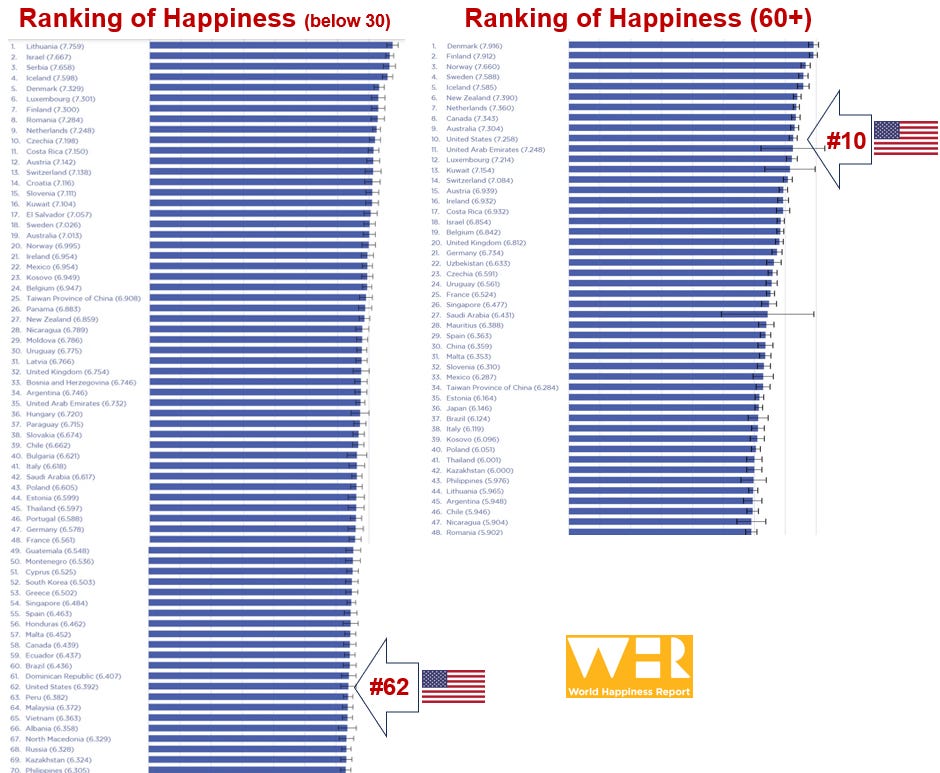Why Young Americans Are Unhappy Despite Living in the Land of Plenty?
A quick look at a surprising paradox
Welcome to Wonderings & Wanderings by Will Reynoir. If you want to get these wonderings from this struggling blogger straight to your inbox, subscribe for free and join the 46 other people following along!
Hey everyone! I hope you’ve had a fruitful week! I say that because we are almost officially in the Summer season with Memorial Day weekend, so it will be peak watermelon slices in the sun time soon enough. I don’t know what y’all got up to this past weekend, but as I mentioned in my last blog, I moved apartments in NYC and now am an East Village resident. This move included a Saturday of me whipping around NYC in a 10-foot U-Haul lugging mattresses, desks, clothes, and anything else that my roommates and I were trying to squeeze into our apartment. I was worried my smaller room wouldn’t be able to fit everything I brought up here with me (much more than one should in NYC), but the room is shaping up all right.
With this life event taking up most of my time this weekend and early this week, so this blog will be shorter than most (probably to many readers’ delight…I know they can prob get kinda long sometimes). However, with the topic I’m writing about, I hope it is just as interesting. So, I’ll stop my stalling for now, and let’s dive into the blog!
The State of the American Youth Mindset
In a Substack Newsletter that has a lot more readers than mine, Washington strategist Bruce Mehlman highlighted some particularly interesting (I would argue alarming in some instances) trends that are emerging from Gen Z and how they view a bunch of issues. Two charts in particular shocked the most people (and thus caught the attention of Axios and political commentators). The first one is about the value disparity between Gen Z & Baby Boomers:
This stark contrast is quite surprising as these topics (besides belief in God/religion IMO) are ones I would assume American citizens would generally all agree on. Similarly, Mehlman noted a significant gap that Americans have in happiness, once again by age:
While these charts have no causal relationship with one another, they both show a very similar trend with younger generations: young Americans are not big fans of America. However, when you look at the overall quality of life stats between America and most other countries, all indicators suggest that young Americans should be big fans of the place they call home.
Firstly, it is a powerhouse of innovation, having birthed groundbreaking technologies throughout its history ranging from agricultural revelations like the cotton gin to modern innovations like the internet, personal computers, and smartphones. Additionally, America is home to many of the world’s most prestigious academic institutions such as Harvard, MIT, and Stanford, attracting the brightest minds from around the globe, and fostering an environment of unparalleled intellectual growth & research. Furthermore, the United States boasts a robust economy, providing unprecedented opportunities for entrepreneurship and upward mobility. Lastly, its commitment to freedom and democracy serves as a beacon for other nations, and its cultural influence, through music, film, and literature, resonates worldwide. All of these reasons and more are why the US has more international migrants than any other country, including more than the next four countries combined.
It’s obvious that America is one of if not the most desirable places to be in the entire world: I was even talking to someone today who immigrated to America and said the same thing. So what’s the why behind this growing disdain for it?
WHY?
As I have written about previously (shameless shilling of my blog as always), life on earth today is better than at any other point in human history, especially in America. Extreme poverty and child mortality are at all-time lows, literacy and education are at all-time highs, and life expectancy is at the highest it’s ever been (stats from Our World in Data. Truly one of the best websites on the internet). So how is it even possible for young Americans to be as unhappy as they are?
The main culprit: Social Comparison Theory. This is the idea that people come to an understanding of their value in areas like attractiveness, wealth, intelligence, success, etc. not from their selves but through a comparison with others. Undergoing this exercise can have some benefits (ex: motivation), but more often than not, it leaves people deeply dissatisfied with themselves and their own lives as they always see the things they don’t have. Even as someone who is pretty grateful, self-aware, and very happy in life, I even catch myself running these comparisons in my head.
The worst part about this exercise is that no matter where you are in the hierarchical totem pole of wealth, success, attractiveness, etc., you can still be subject to the discontent that comparing yourself to others brings. Look at the graphic below as a great example:

Modern times have only made this psychological phenomenon worse. The arrival of social media, which has built trillions of dollars of value to the US economy (a good thing), has exponentially heightened the negative consequences of social comparison (a bad thing). Studies have found that comparisons on social media are more likely to be upward comparisons (where the target is deemed superior to oneself) which is linked to negative psychological outcomes such as low self-esteem and depression. There’s no bucking this social media trend any time soon, so how can you, the one reading this struggling blogger’s post, break out and escape this mind virus?
Some Solutions?
In my opinion, the easiest way to gain some gratitude and begin enjoying our lives more here in the US is to take a step back and zoom out to look at our lives versus the rest of the world as well as go back in time and comparing our lives to Americans in previous decades. When you do that, the general picture of life looks awfully good.
By international standards, American citizens are some of the wealthiest people on the planet. To be a part of the global 1%, you need to earn an income of $60k or more. Roughly speaking, about 37% of all Americans fall above that threshold and are thus considered in the global 1% of income earners in the world. This is mainly due to how big the US economy is compared to the rest of the world, which allows even some of the poorest people in the US to have items like refrigerators, AC units, washers & dryers, garbage disposals, etc., which are luxury items in many other places. As former President John F. Kennedy said:
Looking back in time also provides glaring examples of human progress and achievement, and shows just how amazing life in the US truly is today. Let’s go over one example. As of January 2024, about 90% of Americans own a smartphone. Now this seems normal until you consider the fact that the computer power that these smartphones are capable of is more computer power than the entire Apollo 11 mission that sent men to the moon. Think about that for just a second: a government project that cost over $280 billion in 2020 dollars has less power than a thin piece of metal that almost every American carries around with them anywhere they go. If you were to take today’s Americans back in time, even the richest among them would marvel at the amazing things today’s people can do, buy, etc.
One last solution is for people to stop focusing on things that money can buy, and instead start trying to fill your life with the things that it can’t. In a recent episode of the Modern Wisdom podcast, men’s work coach Jimmy Rex lays out the three main things no amount of money can provide to someone (even the richest of rich):
Suppose more people started to focus on achieving these three key aspects of life instead of wishing for what they could have, how they could look, etc. In that case, I think we’d start to see Americans become happier individuals and also have a better outlook on the country as a whole.
Is America the best at everything? No. Is America a perfect country that is void of any issues? Far from it. However, this country is truly a marvel and a revelation in the long span of human history. Appreciate it for all it is, all it was, and all it aspires to be moving forward.
Thanks for reading. As I noted, I got to this much later in the week than I normally do to the point where I thought I would just postpone it until next week (the horror). The streak remains alive and well for now, but will be tough to keep up for the next few weeks as I’ve got some adventures planned ahead (with one possibly insane trip next weekend; stay tuned for more potential). I wish anyone reading this a happy, healthy, and fun Memorial Day weekend! Until next time my fellow wanderers.
Click the links below, or reach out to me here:
Email: wreynoir@gmail.com







